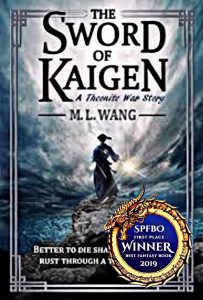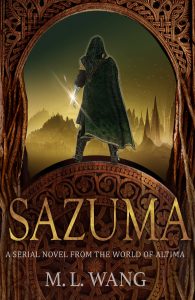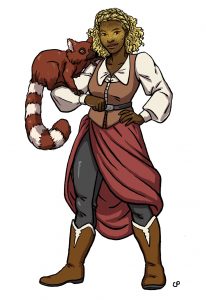Magic and Matriarchy – Guest Post by M. L. Wang
Today we’re thrilled to share with you a guest post from self-published author M. L. Wang.
Wang is perhaps best known for her Theonite series of novels, with Sword of Kaigen winning SPFBO 5.
Currently, Wang is serialising Sazuma on her Patreon (free sample chapter here). There’s also another serial available free through her newsletter, and there will be more Altima books coming out in 2022. To keep up to date on all Wang’s news, please check out her website: mlwangbooks.com
Magic is so ubiquitous in fantasy that it’s easy for an author to throw it into a story without thinking hard about what she wants to do with it—or perhaps not thinking past “this would be cool.”
I’m a huge fan of the “Rule of Cool,” in both the fiction I write and the fiction I consume. But I’ve also learned that uncritically borrowing one’s favorite tropes can cause problems further on in the writing process. To illustrate this, we’re going to look at the mistakes I’ve made with magic systems and what I’ve learned from them.
Before we start, a disclaimer: some authors give lovely, succinct guidelines on how to write better and read more informedly. I’m not one of those authors, and this isn’t one of those posts. I’m just going to walk you through a blunder I made once (almost twice) and see what we get out of it. Because for me, writing isn’t about reading advice on what has worked for others. It’s a process of making my own disastrous mistakes and learning from them. The only thing you can do wrong in this process is make the same mistake twice… which I did. Almost.
PART I: The Magic Mistake Awakens
 My previous series, Theonite (now discontinued for this, among other reasons), featured a hereditary elemental magic system in which different races could control different traditional elements like water, air, and fire. Incidentally, I was really into Avatar: The Last Airbender. See above about uncritically borrowing from your favorite media.
My previous series, Theonite (now discontinued for this, among other reasons), featured a hereditary elemental magic system in which different races could control different traditional elements like water, air, and fire. Incidentally, I was really into Avatar: The Last Airbender. See above about uncritically borrowing from your favorite media.
Why do I consider this a mistake?
Well, because the story of Theonite outside of the magic was very preoccupied with racial injustices. As a biracial teenager building my first really big fictional world, I pulled in story elements on whims and mood swings more than logic. At the time, I didn’t see anything wrong with throwing the type of magic system I liked best into a story about the issues that were most important to me.
However, as I continued writing Theonite into my adulthood, I struggled with a growing tension between the story’s magic and its themes. The problem is that race isn’t a physical (or magical) reality as much as a social construct. The evil in the concept of race is that it falsely equates a person’s physical appearance with qualities like strength, intelligence, and aptitude in different disciplines. Thus, it’s contradictory to point to the evils of racial prejudice in a universe where peoples’ race isn’t a construct but represents a dramatic difference in their physical and magical abilities.
A race-based magic system is antithetical to an honest discussion about racial injustice. You can have one or the other, not both. In short: the magic system didn’t suit the themes and character arcs I wanted to explore. It undermined them.
PART II: The Magic Mistake Strikes Again
I set out to construct my new universe, Altima, determined not to repeat the missteps I made as a younger world-builder. The one thing I did want to carry over from Theonite was the role of emotion in magic. This led me to tactomancy, a touch-based system allowing the practitioner to give, receive, or amplify strength and emotions through skin-to-skin contact.
A new-to-me thing I wanted to try was writing a matriarchal city-state, and this became the titular setting for my epic fantasy serial, Sazuma. My first (thoughtless) impulse was that the tactomancy of Sazuma should be gendered. That’s the easiest way to construct a magical matriarchy, right? If only the women enjoy the use of magic, they default to the top of the social hierarchy.
Thankfully, I was only a few thousand words into this concept before I got a feeling of deja vu and stepped back to reassess. Remembering my issues with Theonite, I asked a question I should have asked at the beginning:
What does this magic system imply about human behavior and society?
 The answer was similarly problematic. Using a gendered magic system to create a fictional hierarchy implies that gendered hierarchies in real life are based on innate qualities—the same way that using a race-based magic system implies that racial inequity is based on innate qualities.
The answer was similarly problematic. Using a gendered magic system to create a fictional hierarchy implies that gendered hierarchies in real life are based on innate qualities—the same way that using a race-based magic system implies that racial inequity is based on innate qualities.
Oops.
In defense of early-2020-me, a gender-based magic system isn’t quite as disingenuous as a race-based one. After all, most societies have historically built distinct gender roles around the demands of childbirth. Depending on the culture, this gets extrapolated into other power dynamics and injustices that are less practical and more malicious. Introducing magical abilities could be a way to mitigate that, but is changing the physical demands of childbirth necessary to creating a female-dominated society? Historically, no. There have been many matriarchal and matrilocal cultures that existed in the absence of magic.
Furthermore, looking back at my notes, I had already come up with a long history of non-magical circumstances that led to the development of the matriarchal state. Tactomancy, on top of that, would be redundant. So, what was it I wanted from this magic system? To answer that, I had to back up further yet and ask two more foundational questions I shouldn’t have skipped in the concept stage:
What themes am I trying to explore with this story?
All stories of Altima deal on some level with resource inequity. One of my intentions with Sazuma was to illustrate the ways social structures get manipulated over time to benefit those at the top at the direct expense of the masses.
How can the magic system help me explore this theme?
In this specific case: how can tactomancy help me look at the relationship between social structures and resources?
Well, if tactomancy isn’t itself a social force stacking the deck in favor of women, then it should be a type of resource, right? The nearest equivalent would be literacy, a skill anyone can achieve with the right training but also one an aristocracy can easily limit to its own ranks by manipulating the education system. To stay on theme, I concluded that the source of Sazuma’s gender inequality should not be the magic itself but the social structures built to restrict and exploit its use.
I won’t bore you (and myself) detailing the plot and world of Sazuma. Suffice it to say, I gave the men their magic back and baked inequity into the city-state’s cultural conventions instead. And I think that the themes and magical funtimes are both stronger for it. I’m still serializing Sazuma through my Patreon, so it remains to be seen whether I’m entirely happy with the finer points of the world-building. But I’m confident, at least, that I haven’t dug myself into a dead-end the way I did when I was a teenager.
Crisis averted.
PART III: The Magic Solution

Damored, a Tactomancer of Sazuma by Cat Parra
That heading was a joke. Of course, there are no magic solutions in writing. That said, if you’re plotting or reading a fantasy book and something about it seems off, I think it’s worth asking:
What themes is this story trying to explore?
And,
Is the magic system helping or hindering that exploration?
This post focused on my struggle with magic systems, but I believe these are good questions to ask not just about magic but other elements of a fantasy story, such as forms of government, the nature of divinity, relevant character arcs, the aesthetic trappings of the setting, anything.
And authors, if you borrow a concept from another world, be clear on why you’re doing it.
Rule of Cool is a 100% legitimate reason, by the way. Just make sure you check that this flavor of Coolness doesn’t undermine the themes at the beating heart of your story. Furthermore, if you make a ruinous world-building mistake, do pay attention to why, so you can not immediately make it again.
M. L. Wang is a fantasy author, martial artist, and weird recluse currently hiding somewhere in Wisconsin with her maroon-bellied parakeet, Sulu. She enjoys gruesome nature documentaries and long walks in circles around her room.

[…] Finally, a cool article on magic from ML Wang over the Hive – Magic and Matriarchy – Guest Post by M. L. Wang | The Fantasy Hive […]
Thought-provoking!
My WIP has a race-based magic – more or less. Quite a lot of tribalism results, though not separatism (you don’t want to alienate people with useful abilities). The theme is around identity – what happens when the magic=tribe=identity equation breaks down?